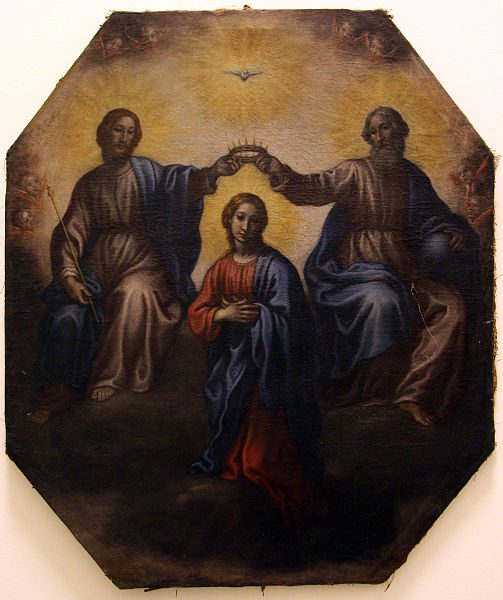
In this painting of the coronation of the Virgin Mary, the Son sits at her right, a very anthropomorphic God the Father is on her left, and the Holy Spirit is represented by the dove over her head.
(Wikimedia Commons public domain)
1.
“If you love me, you will obey my commandments. . . . The person who has my commandments and obeys them is the one who loves me. The one who loves me will be loved by my Father, and I will love him and will reveal myself to him.” (John 14:15, 21)
There is, as I’ve noted before, little if anything to support a teaching of salvation by grace alone, without works, in the four New Testament gospels.
2.
In John 14:16, the Savior promises his disciples that he will send them “another comforter” — or, alternatively, another “advocate” or “counselor” or “helper” — after his departure.
The Greek word is paraklêtos (παράκλητος, often Anglicized as Paraclete). Etymologically, it means something like “called to one’s side.”
It has traditionally and very commonly been taken to refer to the coming of the Holy Ghost or Holy Spirit — and the events of Pentecost (Acts 2:1-6) have usually been understood as representing the prophecy’s fulfillment.
However, a very old Muslim argument — it goes back at least to Ibn Ishaq, the eighth-century biographer of Muhammad, who seems to have had a Christian grandfather — has seen this passage as a prophecy of the coming of the Prophet-Founder of Islam.
The argument is based upon Qur’an 61:6, which reads (in my translation) as follows:
“And when Jesus, son of Mary, said ‘O children of Israel, truly I am a messenger of God unto you, confirming what came before me of the Torah, bringing good news of a messenger after me whose name shall be Ahmad [أحمد].'”
Ahmad [أحمد] comes from the same root [حمد; hmd] as Muhammad [محمد], a root conveying the notion of “praise,” and the Qur’anic passage immediately above plainly treats the two names as equivalents, with both meaning roughly “praiseworthy.”
The text of John 14:16, the argument sometimes continues, has been corrupted. The word paraklêtos should actually read periklytos, a hypothesized Greek term that doesn’t appear in either the Greek New Testament or the ancient Septuagint Greek rendition of the Old Testament but that would, if it did, mean “famed,” “illustrious,” or even . . . “praiseworthy.”











